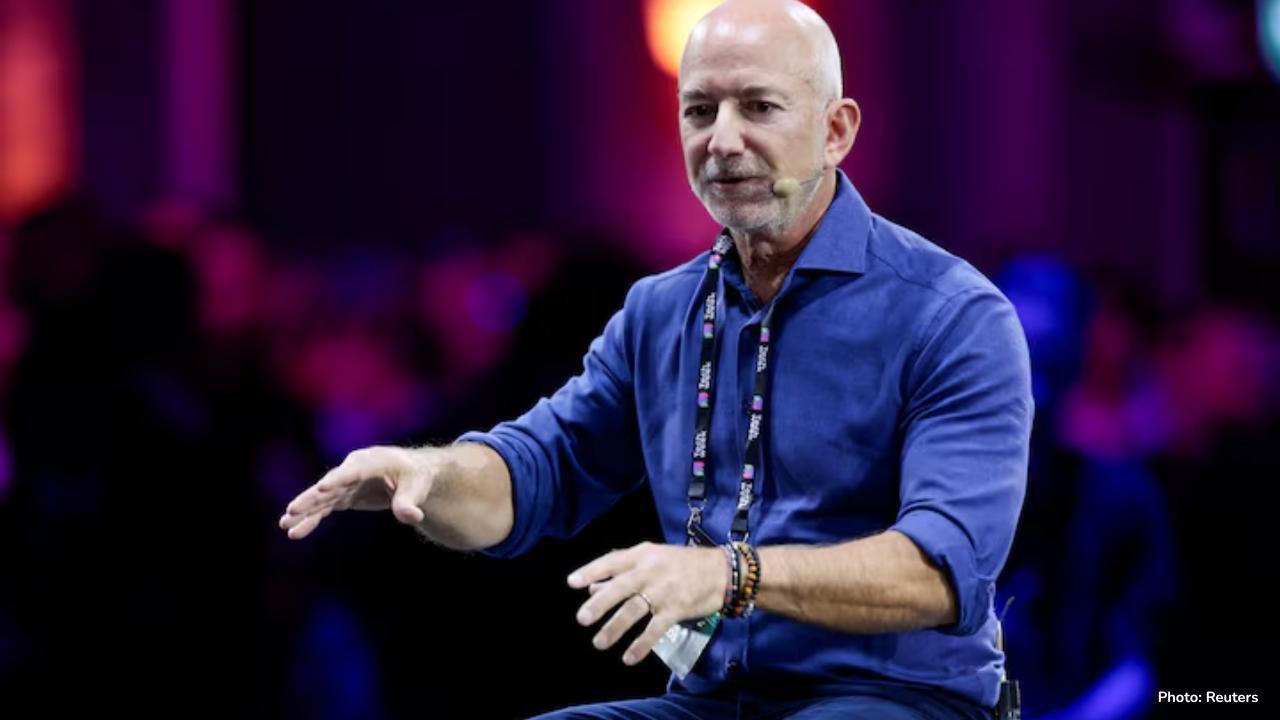
Post by : Monika
Jeff Bezos, the founder of Amazon and space company Blue Origin, has shared an ambitious plan for the future of technology. He believes that data centres—the large facilities that store and process digital information—could eventually be built in space. These space-based centres would use solar energy and could offer major advantages over Earth-based data centres.
Bezos predicts that this transformation could happen within the next 10 to 20 years, as technological progress and space infrastructure improve. His idea is not just about innovation for its own sake but also about addressing environmental and practical challenges that current data centres face on Earth.
Why Space-Based Data Centres?
Modern data centres consume enormous amounts of electricity and water to keep servers cool. The growth of artificial intelligence (AI), cloud computing, and online services has made this demand even higher. Many Earth-based facilities struggle to meet these needs sustainably.
Bezos believes that space could offer a solution. In space, solar power is continuous and uninterrupted by weather, clouds, or day-night cycles. This allows energy generation 24/7, which could make space-based data centres much more efficient and reliable.
Additionally, space-based facilities would not compete with human populations for land or water. They could be built far from Earth, using satellites and orbital platforms to house servers and energy equipment. This reduces the environmental impact of massive server farms that are currently built on Earth.
Technical Challenges
While the idea is exciting, building data centres in space comes with significant challenges.
Launch Costs: Transporting large amounts of hardware into orbit is expensive. Rockets are costly, and sending heavy equipment like servers and cooling systems into space adds to the difficulty.
Maintenance and Repairs: In space, equipment is exposed to extreme temperatures, radiation, and micrometeorites. Maintaining and repairing these facilities would require advanced robotics or human astronauts.
Data Transmission: Transmitting huge amounts of data between space and Earth at high speeds is technically complex. Efficient communication networks and satellites are necessary to ensure low latency and high reliability.
Despite these obstacles, Bezos is optimistic. He compares space-based data centres to the development of satellites for communication and weather monitoring, which also faced high costs and technical challenges in their early days but are now essential parts of modern life.
Bezos’ Broader Vision for Space
Jeff Bezos sees space as more than just a place for exploration. He envisions it as a platform for solving Earth's problems. Space technology can provide solutions in energy, communications, and manufacturing.
Energy: Solar power in space is more efficient because it is constant and uninterrupted. This energy could be transmitted back to Earth using microwaves or lasers.
Manufacturing: Space allows for production in zero gravity, which could create materials and products not possible on Earth.
Communications: Satellites already make global internet and communication networks possible. Space-based data centres would further strengthen these systems and support AI and cloud computing globally.
Bezos’ vision connects these ideas. He believes that using space for data centres is a natural progression of our increasing reliance on digital infrastructure and cloud services.
Impact on Technology and AI
The demand for AI applications is growing rapidly. Training AI models requires enormous computing power, which in turn increases energy consumption. Space-based data centres could provide unlimited computing resources, powered by solar energy, to support AI research and cloud services.
For example, AI systems for language translation, image recognition, or climate modeling require massive servers running continuously. Space-based data centres could meet these energy and processing demands without harming Earth's environment.
Environmental Benefits
Building data centres in space could have positive environmental impacts on Earth.
Reduced Energy Consumption on Earth: Less electricity would be drawn from Earth’s grids for massive server farms.
Less Water Usage: Current data centres use water for cooling. Space-based centres would rely on space-based cooling methods, eliminating the need for large water resources.
Lower Land Use: Earth-based server farms occupy large areas of land. Space-based centres would free up land for agriculture, cities, or natural habitats.
By moving data infrastructure to space, Bezos envisions a future where technological growth is sustainable and less harmful to the planet.
Economic Considerations
Additionally, these centres could open new commercial opportunities, such as global AI services, high-speed cloud computing, and data storage for industries worldwide.
Industry Reactions
Global Implications
The development of space-based data centres could change how nations manage technology, data security, and energy consumption.
Jeff Bezos’ vision of space-based data centres represents a bold step for technology and sustainability. By moving massive computing facilities to space, powered by continuous solar energy, humanity could achieve more efficient, reliable, and environmentally friendly data infrastructure.
While there are significant challenges, including cost, maintenance, and data transmission, the potential benefits are enormous. Space-based data centres could support AI development, reduce environmental impact, and open new economic opportunities.
Bezos’ vision is not just about innovation in space; it is about reimagining the way humans interact with technology and energy on Earth. If realized, it could lead to a future where space becomes an essential part of our global digital infrastructure, supporting everything from cloud computing to AI applications, in a sustainable and scalable manner.










OpenAI Highlights Growing Cybersecurity Threats from Emerging AI Technologies
OpenAI has raised alarms about the increasing cyber risks from its upcoming AI models, emphasizing s

Manchester City Triumphs 2-1 Against Real Madrid, Alonso Faces Increased Scrutiny
Manchester City secured a 2-1 victory over Real Madrid, raising concerns for coach Xabi Alonso amid

Cristiano Ronaldo Leads Al Nassr to 4-2 Victory Over Al Wahda in Friendly Face-Off
Ronaldo's goal helped Al Nassr secure a 4-2 friendly win over Al Wahda, boosting anticipation for th

Landon Donovan Challenges Australia Coach on World Cup Prospects
Landon Donovan counters Australia coach Tony Popovic’s optimism for the World Cup, expecting an earl

Mercedes-Benz Forms Landmark Partnership with WTA
Mercedes-Benz and the WTA unveil a significant partnership effective January 2026, with major invest

Abhishek Addresses Divorce Rumours Concerning His Family
Abhishek Bachchan confirms that daughter Aaradhya remains oblivious to divorce speculations, focusin